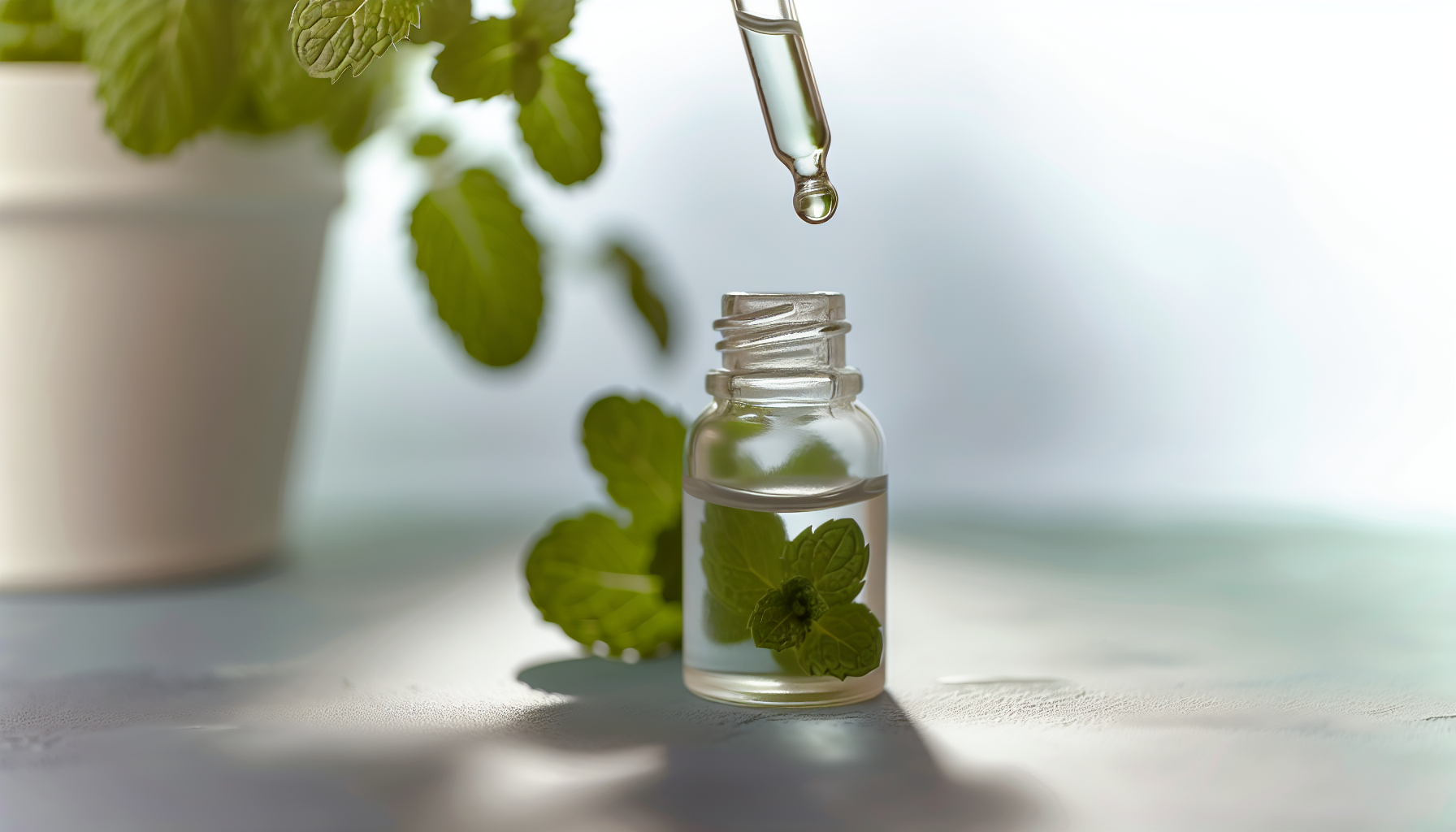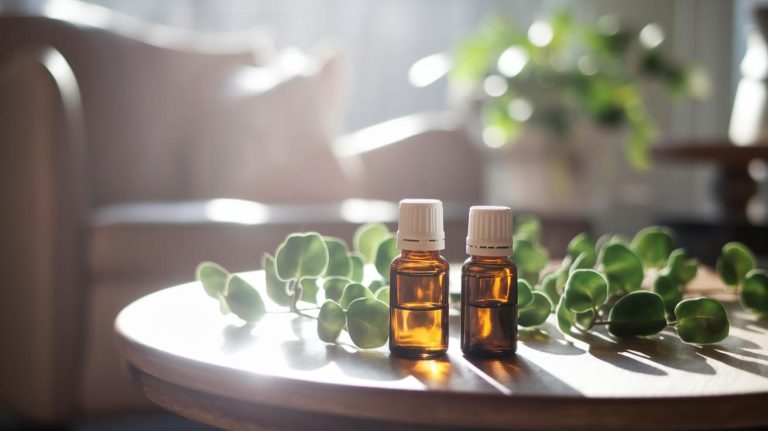4 Essential Oils to Help Bronchitis
Let’s take a journey through the aromatic world of essential oils and explore their potential role in combating bronchitis. But wait, you may ask, how can oils derived from plants provide relief for an ailment that leaves many gasping for breath? Well, nature often has the best remedies, and in the case of bronchitis, 4 essential oils to help bronchitis may just be the natural relief your lungs need.
Bronchitis – the mere mention may cause some of us to wince, remembering days filled with a persistent cough and the struggle to breathe comfortably. It’s a condition that impacts many of us, so it’s worth exploring alternative remedies that could make these trying times a little easier. Let’s begin our exploration by understanding bronchitis.
Key Lessons
-
Bronchitis can be treated with essential oils, which have antibacterial, antiviral and anti-inflammatory properties.
-
Usage of essential oils should always be done in accordance to safety guidelines to avoid adverse effects.
-
Additional supportive practices such as staying hydrated and using a humidifier may provide relief from symptoms of bronchitis.
Understanding Bronchitis

Bronchitis, a condition that throws our respiratory tract into turmoil, is characterized by the inflammation of the bronchial tubes. The result? A bout of coughing, production of mucus, and difficulty breathing – an uncomfortable trio that can disrupt our daily lives. The form of bronchitis you’re battling could be acute or chronic, each bringing their unique set of challenges. In this context, it is essential to discuss respiratory tract diseases highlighting bronchitis as a common example.
Acute bronchitis is a short-term annoyance, primarily instigated by viruses. However, bacterial infections aren’t innocent, causing approximately 40% of acute bronchitis cases.
Chronic bronchitis, on the other hand, is a long-term condition and a type of chronic obstructive pulmonary disease (COPD). The persistent cough and difficulty breathing can be draining, but could essential oils be a tool to alleviate these symptoms?
Indeed, essential oils for bronchitis have been gaining recognition in the realm of natural remedies. But how do these aromatic compounds aid in treating bronchitis, and what role do they play in our respiratory health? Prepare to journey into the fragrant world of essential oils.
The Role of Essential Oils in Respiratory Health

Essential oils, the distilled essence of plants, are packed with beneficial chemicals that offer a range of therapeutic properties. They don’t just smell good; they have antibacterial, antiviral, and anti-inflammatory properties, making them a powerful ally in combating respiratory ailments such as bronchitis.
These potent oils, comprising oxygenated terpenoids, inhibit bacterial growth, making them a natural alternative for treating bronchitis and a host of other respiratory tract diseases. They can be administered in various ways, from inhalation to topical application, each offering unique benefits.
Certain essential oils, like cypress, even have expectorant properties, thinning mucus and facilitating its expulsion through coughing. Essential oils for coughing can be particularly helpful in treating bronchitis, where mucus buildup can cause discomfort and exacerbate symptoms.
Having established the role of essential oils in respiratory health, we can now investigate specific oils that can be beneficial in fighting bronchitis.
Eucalyptus Essential Oil

Eucalyptus essential oil, imbued with the refreshing scent of the eucalyptus tree, is not just a pleasant aroma. This oil is a powerhouse when it comes to antimicrobial and anti-inflammatory properties, making it effective in treating coughs, colds, and bronchitis.
It contains 1,8-cineole, a compound beneficial for a range of respiratory conditions, including:
-
bronchitis
-
coughs
-
colds
-
catarrh
This compound can offer relief from symptoms associated with upper respiratory tract ailments, making eucalyptus oil an effective natural remedy.
While eucalyptus oil shows promise, understanding its safe and effective use is crucial. We will now examine the recommended usage and safety guidelines for eucalyptus essential oil.
Usage and Safety Tips
Eucalyptus essential oil can be utilized through inhalation or topical application. Inhalation typically involves using a diffuser or adding a few drops of the oil to hot water for steam inhalation. It is recommended to use 12 drops of eucalyptus oil per 150 ml of boiling water or a 1.5% V/V solution from one tablespoon per litre of warm water when inhaling it. This can be done up to three times daily..
For topical application, it is recommended to use 1.3% V/m eucalyptus oil in ointments for adults and children over 12 years old. This application can be done up to three times daily, offering relief for bronchitis symptoms.
However, it’s important to note that eucalyptus oil should not be used for children under 2 years old and pregnant women. Always ensure that eucalyptus oil is used in a diffuser, steam bath, or diluted with a carrier oil for topical application to ensure safe usage.
Having discussed eucalyptus, we will now transition to another potent oil – tea tree oil.
Tea Tree Essential Oil

Tea tree oil, a potent extract from the tea tree, is renowned for its antiviral and antibacterial properties. These properties make it effective in the treatment of various infections, including bronchitis. The oil’s anti-inflammatory characteristics can potentially assist in alleviating airway congestion, loosening mucus, and providing relief from bronchitis symptoms.
Inhaling tea tree oil can alleviate coughs and provide relief from cold symptoms, further proving its potential as a natural remedy for bronchitis. Just as with eucalyptus oil, there are certain usage and safety guidelines to follow when using tea tree oil.
Usage and Safety Tips
For topical application, it’s recommended to dilute tea tree oil with a carrier oil at a ratio of 1 to 2 drops of tea tree oil to a small amount of carrier oil before applying it to the skin. For aromatherapy, you can add 3-5 drops of tea tree oil to the water in a diffuser and allow the oil to disperse into the air.
However, similar to eucalyptus oil, it’s recommended to avoid using tea tree oil during pregnancy due to insufficient data on its safe use for pregnant women. Always consult with a healthcare professional before using essential oils during pregnancy.
Peppermint Essential Oil

Breathing in the refreshing scent of peppermint essential oil might do more than just uplift your spirits. This oil has the potential to relax bronchial muscles, facilitate breathing, and alleviate coughs, making it a powerful ally against bronchitis.
Animal studies have demonstrated that peppermint essential oil, containing a substantial amount of menthol, has the capacity to alleviate bronchial spasms. Further research indicates its potential to relax the muscles of the windpipe, offering potential benefits for individuals with bronchitis.
To use peppermint oil for bronchitis, you can utilize 3 to 5 drops of the oil diluted in a carrier oil such as sweet almond, olive, or warmed coconut oil. This can be administered topically through chest massage or inhalation from the bottle or a diffuser for rapid relief. As with the other essential oils, there are certain safety precautions to adhere to when using peppermint oil.
Usage and Safety Tips
Peppermint oil can be safely utilized in a diffuser, steam bath, or when diluted with a carrier oil for topical application. When diluting, it is recommended to mix a few drops with hot water or use a ratio of 1:4 with a carrier oil. However, the utilization of undiluted peppermint essential oil can result in skin irritation, allergic reactions, and burns. Proper dilution of essential oils is essential to mitigate adverse effects, particularly on sensitive skin, and application in the nostrils should be avoided.
Additionally, peppermint essential oil is not recommended for children under 2 years old due to the potential risk of increasing seizures. It’s advisable to wait until children are older before using peppermint oil.
Though peppermint essential oil can provide relief for symptoms such as nausea and muscle aches in pregnant women, it’s crucial to seek medical advice before using it to ensure safety during pregnancy.
Thyme Essential Oil
Thyme essential oil, though less known, is a potent ally in the battle against bronchitis. Known for its antimicrobial and anti-inflammatory properties, thyme oil is effective in treating respiratory disorders, including bronchitis.
Thyme essential oil can provide relief for respiratory disorders, including bronchial catarrh, and as a supportive treatment for pertussis. Its versatile therapeutic benefits make it a worthy addition to your arsenal of essential oils for bronchitis.
In fact, thyme essential oil, containing thymol, is generally considered safe for human use in current preparations. However, like the other essential oils, there are certain safety guidelines to follow when using thyme oil.
Usage and Safety Tips
Thyme essential oil can be applied for bronchitis relief through gargling with a warm water mixture, inhalation via a diffuser, or inhalation of steam during a steam bath. For inhalation purposes, it’s recommended to use 4–5 drops of thyme essential oil in a diffuser or steam bath.
Thyme essential oil should be diluted with a carrier oil for topical application, and is not advised for use on children under 2 years old or pregnant women. To ensure safe usage, consider using a properly diluted essential oil blend, such as geranium essential oil, instead.
Potential adverse effects of utilizing thyme essential oil include:
-
Allergic reactions
-
Dizziness
-
Conjunctivitis
-
Headaches
-
Asthma
-
Irritation of the mucous membranes
-
Abdominal cramps
It’s imperative to exercise caution when using the oil and seek guidance from a healthcare professional before usage.
Additional Supportive Practices
While essential oils can provide relief for bronchitis symptoms, there are additional supportive practices that can complement your essential oil regimen. One such practice is staying hydrated. Proper hydration can facilitate mucus thinning and easier expectoration, aiding in replenishing fluid loss and preventing dehydration. It’s advisable to consume ample fluids, particularly water.
Another beneficial practice is using a humidifier, which can introduce moisture into the air, alleviate irritation in the bronchial tubes, and facilitate the expulsion of mucus buildup. This can contribute to reducing coughing and improving respiratory comfort. However, it’s essential to maintain regular cleaning of the humidifier to prevent the proliferation of bacteria or mold.
Practicing deep breathing exercises is another supportive practice that can improve lung function and alleviate symptoms of bronchitis. Some beneficial exercises for individuals with bronchitis include:
-
Slow and deep breathing
-
Active expiration
-
Pursed-lip breathing (PLB)
-
Relaxation breathing
-
Diaphragmatic breathing
These exercises can help improve lung function and provide relief from bronchitis symptoms.
Other Great Essential Oils for Bronchitis
In addition to the primary essential oils discussed earlier, oregano, frankincense, rosemary, and lavender are among the other essential oils that may offer relief for bronchitis.
Frankincense essential oil, for instance, is known for its capacity to alleviate pain and inflammation, which may prove beneficial for managing bronchitis symptoms. Rosemary essential oil also has properties that have a calming effect on the muscles in the trachea, offering respiratory relief for those dealing with bronchitis.
Best Essential Oil for Asthma
Lavender essential oil, with its soothing and calming effects, is another potential alternative for bronchial asthma and bronchitis. As with the other essential oils, it’s vital to adhere to safety guidelines and seek advice from a healthcare professional before using these oils to treat bronchitis.
While asthma and bronchitis both affect the respiratory system, the key differences lie in their triggers, underlying causes, and the specific parts of the airways they affect. So, in many cases, the best essential oils for asthma and bronchitis are similar.
Precautions and Consultations
Though essential oils provide a natural, alternative bronchitis supportive therapy for treating inflammation in the lungs, it’s imperative to proceed with caution and seek guidance from a healthcare professional before initiating any essential oil regimen. This is particularly important if you have pre-existing conditions, are pregnant, or plan to use them with children.
For instance, pregnant women are advised to refrain from using eucalyptus, rosemary, and tea tree essential oils for bronchitis, as these oils are not recommended during pregnancy. Similarly, parents should approach the use of essential oils for their children with caution and seek guidance from a healthcare professional, particularly when using oils like lavender, which may be suitable for children.
It’s also important to be aware of the potential risks and side effects associated with the use of essential oils for bronchitis, which may include:
-
Skin irritation
-
Allergic reactions
-
Headaches
-
Interaction with prescribed medications
Summary
The journey through the world of bronchitis and essential oils has come to an end, but the knowledge you’ve gained is just the beginning. We’ve ventured through the aromatic world of essential oils, exploring their potential in alleviating bronchitis symptoms. We’ve discovered that essential oils like eucalyptus, tea tree, peppermint, and thyme, each with their unique properties, can offer a range of benefits for those battling bronchitis.
In addition to these oils, there are other essential oils, such as oregano, frankincense, rosemary, and lavender, which may offer relief for bronchitis. However, the use of essential oils should always be accompanied by other supportive practices such as staying hydrated, using a humidifier, and practising deep breathing exercises.
But remember, while the world of essential oils holds promise, it’s crucial to use them safely. Always follow safety guidelines, dilute essential oils appropriately, and consult with a healthcare professional before starting any essential oil regimen for bronchitis.
Frequently Asked Questions
What is the best essential oil for bronchitis?
Eucalyptus, geranium, bergamot, and lavender essential oils are some of the most popular essential oils for treating bronchitis. These oils can help soothe a sore throat and coughing, as well as fight infection.
What essential oil clears lungs?
Eucalyptus, peppermint, and lemon essential oil blend can clear the airways and promote healthy breathing.
How can I safely use eucalyptus essential oil for bronchitis?
Eucalyptus essential oil can be safely used for bronchitis through inhalation or topical application when diluted with a carrier oil; however, it should be avoided in children under 2 and pregnant women.
What are some supportive practices to complement the use of essential oils for bronchitis?
Staying hydrated, using a humidifier, and practising deep breathing exercises can help complement the use of essential oils for bronchitis, improving lung function by thinning mucus and alleviating irritation.
Are there any safety precautions to be aware of when using essential oils for bronchitis?
When using essential oils for bronchitis, it’s important to dilute them appropriately and consult with a healthcare professional first. Additionally, they should not be used on children under 2 or by pregnant women.


I use doTerra oils all the time. I find that they are the most authentic. Thanks for the info.
I have Bronchialaspergillosis. This causes me to cough (hard) pretty much 24-7. Is there really an essential oil that would help me?
With steam inhalation, 8-10 drops is WAY, WAY to much!!!
I used just one drop of two or three of the oils and the steam was very strong and hard to tolerate because the essential oil off gassing was to strong to tolerate.
I dumped the first batch and reduced it to just one drop of Tea Tree, one drop of Peppermint and one drop of eucalyptus and that made it tolerable to inhale.
I find that diffusing eucalyptus and peppermint together is helpful when congested. The peppermint will also help if you have a headache. Usually a couple of drops of each in your diffuser is adequate because both of these oils are strong. More can always be added if need be.
Pretty much any mint will help.
Is this useful for asthma as well? I think it might help at least with the gunk-in-your-lungs part of it. Coughing up sputum when you’re trying to sleep is no fun!
Essential oils are good for so many health problems.
Great information. am bookmarking this for use this winter
Very helpful info! Thank you!
Love these tips!!
Love all of these oils. Will have to put some in my chest rub next time I get sick.
Love your products! Thank you!
This is so helpful, thank you! I’ll be sure to try these 😉
Essential oils have so many useful benefits. This article gave some great examples of that. Thanks
Love to diffuse these particular essential oils for any respiratory problems. Especially eucalyptus! Helps alleviate congestion and stops sinus infections in their tracks. I would love to get another diffuser so that each room in my home has one.
Love the information in the blog. I am new to essential oils. I love the natural aspect to healing. I have chronic bronchitis. I also have fibromyalgia, which I am looking to get into diffusing more oils to heal with the pain. Thank you for the tips!
No one in my family has had Bronchitis but it’s good to know there are essential oils that can help with it.
This would be really helpful when my husband gets bronchitis.
I didn’t know that lemongrass could kill bacteria. Is the oil more beneficial than the actual plant?
Looks like I need to add lemongrass to my EO collection
I’ve fallen in love with Lemongrass after using it in blends to help heal damaged ligaments. Always good to discover something else that it’s handy for!
Hoping that I wont have to handle bronchitis but in case I do you have the remedy. Thank you for the knowledge.
I love all the information. Love using my oils.
These are great remedies for bronchitis.
Thank you for taking the time to share this information! I think I actually had a mild case of bronchitis a couple months ago. I didn’t diffuse Eucalyptus as it isn’t as safe for kids and my daughter is 4. I think I used Rosalina and lavender.
Before modern medicine, this used to be the way people helped with the symptoms of bronchitis.
Thank you for this wonderful blog!
From a young age I’ve had bronchitis. I have just started my oil journey and can’t wait to use this information to help!
I have had a cold with cough for 28 days. I need to try these oils to help me feel better. Now I know what to purchase!
these essential oils are really helpful in easing the symtoms and preventing a developing brochitis especially using organic aromas waterless diffuser, you can benefit EOs aroma at its purest.
I have asthma and suffer more this time of year. Luckily, I have all these oils and will start diffusing daily to help keep my lungs clear and healthy this winter!
Wow, I’m totally fascinated by ‘Aromatherapy Jewelry’ thank you for the valuable information.
This is excellent information and will be used! Thank you very much!
I knew about Eucalyptus and Tea Tree, but now will add lemongrass and lavender into the mix.
I love Lavender oil for everything ❤️
I swear that peppermint and melaleuca not only help me breathe better at night, but have eliminated my drain flies. Good article.
A few members of my family suffer from bronchitis, so this is very informative
I learned so much
Just got over bronchitis and essential oils helped.
Great article. I have found ‘Burglars’ to be very helpful when I feel congestion starting to build.
This is actually a great product it helps you in various way. Recently I had tried a new essential oil of Nyassa Bath and Body products which is 100% organic and comes up with different flavors and benefits. It is really very amazing product as compared to other essential oils and also it has come up with many exciting Christmas offers,so don’t forget to grab the deal
Just what I needed ! I knew about Eucakyptus – first oil I use in case of cough – but I did lemon rather than lemongrass, and peppermint – I’ll need to try lavender instead.